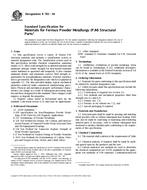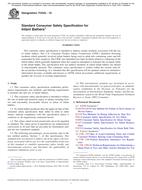1.1 This test method covers determination of the coefficient of linear thermal expansion for plastic materials having coefficients of expansion greater than 1 x 106 1°C by use of a vitreous silica dilatometer. At the test temperatures and under the stresses imposed, the plastic materials shall have a negligible creep or elastic strain rate or both, insofar as these properties would significantly affect the accuracy of the measurements.
Note 1 – There is no similar or equivalent ISO standard.
1.1.1 Test Method E 228 shall be used for temperatures other than 30°C to 30°C.
1.1.2 This test method shall not be used for measurements on materials having a very low coefficient of expansion (less than 1 x 10 6 1°C). For materials having very low coefficient of expansion, interferometer or capacitance techniques are recommended.
1.2 The thermal expansion of a plastic is composed of a reversible component on which are superimposed changes in length due to changes in moisture content, curing, loss of plasticizer or solvents, release of stresses, phase changes and other factors. This test method is intended for determining the coefficient of linear thermal expansion under the exclusion of these factors as far as possible. In general, it will not be possible to exclude the effect of these factors completely. For this reason, the test method can be expected to give only an approximation to the true thermal expansion.
1.3 The values stated in SI units are to be regarded as the standard. The values in parentheses are for information only.
1.4 This standard does not purport to address all of the safety concerns, if any, associated with its use. It is the responsibility of the user of this standard to establish appropriate safety and health practices and determine the applicability of regulatory limitations prior to use.
Product Details
- Published:
- 04/10/2003
- Number of Pages:
- 5
- File Size:
- 1 file , 54 KB
- Redline File Size:
- 2 files , 97 KB


